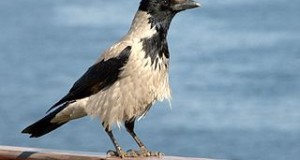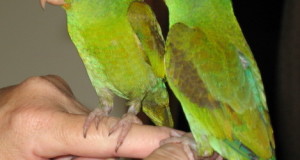Parrots, pheasants, doves, shama thrushes – hobbyists are fortunate in having a great many species of widely differing birds available as pets. It is the tiny and relatively inexpensive finches, however, that offer us the easiest route to a mixed collection of gorgeous species…among no other group is such a diversity of interesting and hardy birds so readily available. Today’s subject, the green twinspot (Mandingoa nitidula), is a perfect example.
Description
Rich olive above and with nearly black wings and, in males, a bright red face, this 4 inch African native is a sight to behold. What truly sets it apart is the breast and abdomen, which are jet black with numerous pure white spots. The overall effect is of a fine hand-painted toy!
Natural and Captive Habitats
Green twinspots are birds of rather open country, but never stray far from thick brush or similar retreats. They favor forest edges, woody scrub and the overgrown margins of rice fields and farms. Captives fare best when given plenty of cover, with a well-planted outdoor aviary being ideal.
When housed indoors, they should be provided with as much room as possible – the Blue Ribbon Peaked Bird Cage is perfect for 2 to 4 twinspots. Some hanging silk plants and thin cotton cable perches will make them feel right at home.
Diet
Green twinspots have higher protein requirements than most finches, and should be offered a diet rich in insects. They readily accept small crickets, mealworms and waxworms and, if kept outdoors, will spend hours chasing small flying insects (which, like minute falcons, they catch on the wing).
Zoo Med Anole Food (dried flies) , canned silkworms , Cede Eggfood and bits of hard boiled egg should also be offered on a rotating basis. A Vita Kraft Sprout Pot will enable you to offer your finches fresh shoots, a favored and important food item. The balance of their diet can consist of high quality finch seed mix to which has been added a bit of Pretty Bird Softbill Select .
Further Reading
You can read about the green twinspots in the wild at http://www.birdsinsa.com/birds/mandingoanitidula.htm.
 That Bird Blog – Bird Care and History for Pet Birds
That Bird Blog – Bird Care and History for Pet Birds


